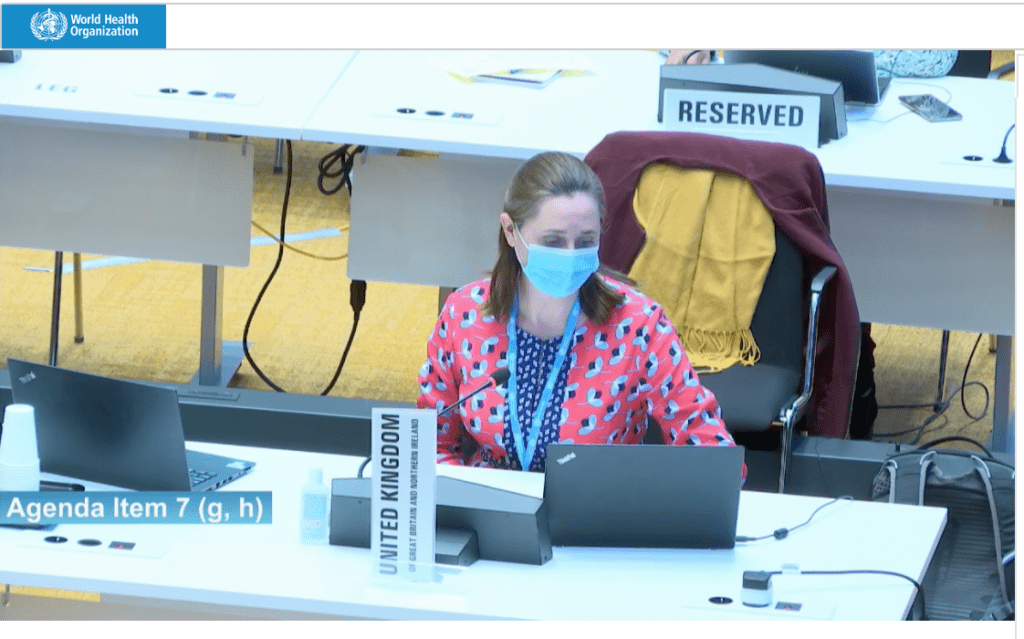(by Anna Dé – WBP Lead Policy and Advocacy)

On 27 January 2022, the Executive Board of the WHO noted the draft Intersectoral Global Action Plan on Epilepsy and other Neurological Disorders 2022-2031 and adopted a draft decision recommending its adoption at the World Health Assembly on 22-28 May 2022.
Back in November 2020, the Seventy-third World Health Assembly adopted resolution WHA 73.10 on Global Actions on Epilepsy and other Neurological Disorders, which requested the WHO Director-General to develop an Intersectoral Global Action Plan on Epilepsy and other Neurological Disorders in consultation with Member States.
Neurological disorders are important causes of mortality, morbidity and disability. They require concerted intersectoral efforts to address the needs of people at risk of, or living with, neurological disorders by providing them with equitable access to effective health care and community-based, social, educational and vocational interventions and services.
Through WBP’s partnership with OneNeurology, we have helped to shape the Global Action Plan during the WHO’s consultation process in 2021, making sure that it comprises all neurological disorders, not only epilepsy. We also played a pivotal role in ensuring that the gender perspective was taken into account.
Some selected highlights from the draft
The draft as it stands currently highlights a number of points that are particularly positive for WBP. Below are just some selected highlights:
- Women are often disproportionately affected by neurological disorders, such as dementia, migraine and multiple sclerosis.
- Mainstreaming a gender perspective on a system-wide basis in all efforts to implement public health responses to neurological disorders is central to creating inclusive, equitable and healthy societies.
- Promote and mainstream population brain health strategies that are age-inclusive, gender-sensitive and equity-based at national, regional and international levels in order to support healthy behaviour for people with neurological disorders, their carers and families.
- If the incidence of neurological disorders is to be reduced and the lives of people with neurological disorders are to be improved, sustained investment in biomedical, clinical, implementation and translational research are crucial to inform prevention, diagnosis, treatment and care and create the potential to cure more neurological disorders.
“We are very pleased to see that our work is paying off, because we are convinced that all research and innovation activities for neurological disorders must be rooted in equity, diversity and inclusiveness, with increased engagement of people with neurological disorders.”, says WBP pro-bono CEO Dr. Antonella Santuccione Chadha.
For those of you who would like to watch a recording of the Executive Board session, where the Global Action Plan was discussed, you can do so by accessing this link. Scroll down on the right to find Session 8, Item 7 (g,h). The relevant part starts at 1:55:50 (it is grouped with discussions on alcohol).
What’s next
There is now great policy momentum in the field of neurological disorders and WBP will continue to provide its expertise in discussions with policymakers and other stakeholders.
The WHO 2021 publication – Global status report on the public health to dementia highlights the overwhelmingly disproportional impact of dementia on women, specifically on mortality, disability and the often-neglected hours of informal care.
We also understand that the WHO is developing a Dementia Research Blueprint, the first WHO blueprint in the context of noncommunicable diseases (NCDs), which aims to represent a roadmap for advancing dementia research and will also address regulatory issues, precision medicine and gender/sex inequalities in research.
As highlighted by The Lancet, 2022 is likely to bring a historic policy change with the potential to impact neurological services worldwide. Of course, the WHO’s Intersectoral Global Action Plan on Epilepsy and other Neurological Disorders is due to be approved at the World Health Assembly in May 2022.
Furthermore, neurological disorders will be prioritised at EU level by the European Commission, with a set of public health actions to be published in December 2023. This work will be part of a ‘Policy Implementation Roadmap’ for noncommunicable diseases (NCDs), due to be launched in June 2022. In December 2022, the European Commission plans to publish action proposals for cardiovascular diseases, diabetes, and lifestyle risk factors. In December 2023, actions on respiratory illnesses and mental and neurological diseases will follow.



